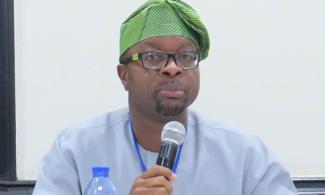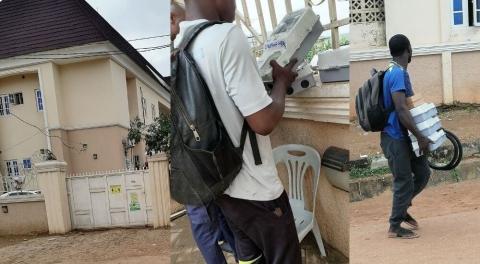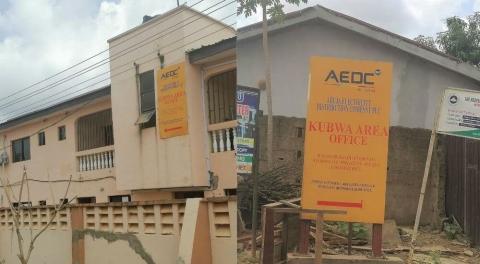
AEDC ‘Enjoys’ Estimated Billing – Official
September 26 was an unusual day for a nursing mother (names withheld) who left her baby at home and hurried to submit an application for a prepaid meter at the office of the Abuja Electricity Distribution Company (AEDC) in Kagini, a suburb of the Federal Capital Territory.
She needed a prepaid meter to get away from the slavery of estimated billing arbitrarily imposed on electricity consumers in her area. She expected free and prompt service as advertised by the Federal Government to promote metering of power consumers in the country.

But she was shocked at the behavior of the first official she met to submit her application for approval. The official, a female, threw her application back at her because she did not pay her “stamping fee” of N5,000 through her.
The official starkly refused to listen to further explanation from her.
Out of frustration, she stormed out of the office to the Area Office of the AEDC located along Gado Nasko road in Kubwa to lodge her complaint and pursue her application for a new meter.
At the area office in Kubwa, she met a receptive officer who listened to her story and lamented the corrupt attitude of some AEDC officials who compromise service for personal gains. Her application was received and she got a promise that it would be treated.
She went back home without a prepaid meter as she had expected, but felt relieved that her application would be processed.
Acquiring A Prepaid Meter
To get a prepaid meter, electricity consumers are usually required to visit the AEDC office nearest to them to initiate a request for metering.
The customer would be given a form to fill in necessary details including two passport photographs, phone number and a valid means of identification.
The power consumer would be asked to pay either N5,000 or N10,000 for “stamping” of their form, depending on the type of meter, after which the customer’s premises would be visited for site verification.
Stamping of application forms is usually done by authorized AEDC contractors, but because of the fee involved, some AEDC officials are said to have also involved themselves in the process so they could get referral kickbacks.
Most officials who spoke to THE WHISTLER at offices of the AEDC in Lugbe, Karu, Jikwoyi, Kurudu, Angwan Gari (Jikwoyi axis), amongst others, said customers are supposed to be metered within 14 days of approval of their application.
Consumers Face Exploitation
This reporter gathered from different electricity consumers that intimidation and deliberate frustration of customers are some of the tactics that officials of the AEDC and the Licensed Electrical Contractors Association of Nigeria (LECAN) employ to exploit power consumers applying for prepaid meters.
It was learnt that unless you’re willing to grease their palms to ‘fast track’ your meter application or prepared to engage in fervent prayers, a consumer may have to wait for “a very long time” before their application is approved and their device installed.
Several power consumers in the FCT confirmed to this reporter that despite the Federal Government’s declaration that prepaid meters were free, some of them were made to pay.
Officials were accused of demanding between N15,000 and up to N90,000 to help “fast track” approval and installation of prepaid meters which, according to the Federal Government, were supposed to be distributed freely to electricity consumers under the Government’s National Mass Metering Programme (NMMP) which kicked off in late 2020.
“I paid close to N90,000 for a three-phase meter,” said a shop owner at Lungi Market, Asokoro, who didn’t want her mentioned for fear of victimisation by the AEDC.
Two other traders at the market who also spoke to this reporter under the condition of anonymity said they paid about N53,000 each for the meters, but noted that the devices were supplied by an unnamed company under an arrangement reached between landlords and the management of the market.
Also, a resident of Kubwa lamented how she had to part with about N55,000 of her hard-earned money in August, 2021, to get a prepaid meter after failed initial attempts to get one for free.
To corroborate these allegations, THE WHISTLER’s reporter visited eight AEDC offices under the Karu, Kubwa and Lugbe area offices, where evidence gathered showed that AEDC and LECAN officials are actively frustrating the bid to end estimated billing and close Nigeria’s metering gap.
‘It Depends On How You Want To Play The Game’
Posing as an electricity consumer in need of a prepaid meter, this reporter visited the Area Office of the AEDC located in the Kubwa suburb of Abuja, where he observed for 20 minutes the interactions between officials and power consumers coming to apply or inquire about prepaid meters.

At the entrance of the building were two security officers who referred the reporter to an electrical engineer (names withheld) after notifying them of his intent.
“I can swear that we’ve met before,” the official told the reporter while racking his brain for a clue on where they might have met. He eventually ushered the reporter to a corner where he attended to him.
The engineer, a member of LECAN, gave a breakdown of the meter application process and the options of a fast-tracked or delayed procedure, but noted that there were currently no meters on ground. He was not aware the conversation was being taped.
“You can pick anyone (prepaid meter), it is just a matter of choice. But if you can afford it, it is better to go for a three-phase since it is your house. If you’re renting, I’d say you should manage a one-phase,” said the official.
He noted that the requirements to get a one-phase or three-phase meter are the same “apart from the money” involved.
“You will need two passport photographs, a valid means of identification and if you’re using the landlord’s name, you are going to provide his means of identification and his passports.
“For us to stamp your form for a single phase, we’ll charge N5,000 and for three-phase we charge N10,000.”
The official demanded N20,000 for a single phase or 35,000 for a three-phase meter, with a promise to ensure the reporter is among the first people to get a meter once they become available.
“If it is single phase, you’ll pay N20,000, but if it’s three phases, it is N35,000,” he said, adding that within two days of arrival of meters, “We will call you to come and carry your meter.”
He noted that, “The timeline (for receiving a meter) is not very specific, I must be sincere with you. It depends on how you want to play the game. If you want to wait for the normal procedure, that one takes longer.”
The official assured the reporter of getting a meter quickly if he went for the “quick time” option as “we are expecting that by the first week of next month (October), the meter train would be back here.”
“That is why you could see people coming to do their things and get ready. So, in that case now, if you want us to facilitate it, it is going to cost you money, but if you want to key in and wait for the process, that one may take a very long time.”
At another office of the AEDC, an official of the Disco (names withheld) confirmed on tape that she received payment of N15,000 to help fast track an application for a prepaid meter.
“Yes, I confirmed (the money). Shey it is N15,000 that you gave me? Be praying so that it (the meter) would come out fast as expected. Be prayerful, God will do it (because) I submitted it yesterday so let’s just wait,” she said.
She had promised that the meter would be ready before the end of September: “Hopefully even before that time, if God is on our side, it may or may not. No problem, it would come.”

AEDC ‘Enjoys’ Estimated Billing – Official
The reporter gathered that contrary to the general perception that electricity consumers were mostly against metering, the reverse was the case as the number of consumers visiting the AEDC offices to apply for prepaid meters indicated that they preferred to be metered.
Besides, the LECAN official at the Kubwa AEDC office said on tape that AEDC “enjoys estimated billing” and would prefer customers to continue to receive estimated bills.
According to the official, if consumers fail to take advantage of the fast-tracked meter application and decide to wait for the normal process, “they (AEDC) would start issuing you bills (estimated billing) and when they start enjoying bills from you, they would not be in a hurry (to approve your application for meter).”
Even if a consumer refuses to be connected to the power grid, he or she would still be issued estimated billing pending arrival of their meter, said the official.
“If you tell the customer care that you want to submit your form, but do not want to be connected to the grid, they will not process this form,” the official was heard telling a female consumer who aired her frustration about the rigorous meter application process.
“For you to be able to submit the form for processing, a contractor needs to sign. We are not AEDC. We are licensed electrical contractors, that is what they call LECAN.
“You cannot get a meter without a contract number. Anything you want to do, get your contract number now,” he said.
Referral Kickbacks, Intimidation and Humiliation of Customers
The inability of electricity consumers to easily access prepaid meters has left some of them at the mercy of AEDC and LECAN officials who take advantage of the situation.
The nursing mother’s experience at the Kagini AEDC indicates that some officials intimidate power consumers who fail to do their bidding.

“She was angry that I didn’t go to her first,” the nursing mother was heard narrating her frustration to the LECAN official at the Kubwa office after the female official at the Kagini office allegedly mistreated her for not using her to get her application form stamped.
Responding, the LECAN official wondered if the AEDC official was authorized as an electrical contractor to stamp the application form.
“They are very corrupt people. Most of them have contractors they use, so they want you to come to them so that when they collect the ‘LECAN money’ and application form from you, they will get a contractor that will stamp it and give them a cut.
Pointing to a section of the form, he noted that it must be “completed by certified/registered electrical engineer/accredited electrical contractor.”
‘Nobody Gets A Meter For Free’
Meanwhile, a former National Electricity Regulatory Commission (NERC) Commissioner of Market Competition and Rates, Eyo Ekpo, said prepaid meters were never meant to be distributed for free to power consumers.
Ekpo, argued that power consumers should not get free meters “because our tariffs are lower than cost” of electricity being consumed.
“Let me clear up something, prepaid meters are not to be given to anybody for free. That is the problem with us in this country, we want everything free, we don’t want to earn it.
“Meters are manufactured and they are part of the equipment that serves you. The mobile phone you have in your hand, you paid for it. Mobile phone companies can also set out a programme, whereby you make a deposit, get a phone but you pay for the phone over time. That’s the way meters are paid for,” he told THE WHISTLER.
On the Federal Government’s directive mandating power distribution companies to distribute meters for free, Ekpo said: “The directive is not that meters are free, as far as I know, I don’t know what they are saying now. But as far as I know, meters are not to be given freely. I can assure you that in the cost of your [electricity] tariff, there is a cost for that meter that you’re using.”

Ekpo argued that, “…the discos don’t have money, the tariff that you and I are using is not an economic tariff, it doesn’t cover the cost of our service. If [consumers] are asked to pay for the cost of our service, we will all take up arms, NLC will stand up and say that you people should go on strike and we will go on strike because we are being asked to pay the right price for electricity. In that price is the cost of the meter, but because our tariffs are lower than cost, so many things that we (electricity consumers) should get, we cannot get. One of them is the meter.
“The programme that we had before was that “Ok, I will give you the money for the meter”. At the time, it ranged from N15,000 to N50,000 or something like that, depending on the kind of meter. “I will recover the cost of this meter from my tariff, because I should not pay upfront for it.” That was the arrangement and I think that is still the arrangement.
Ekpo also frowned at the words “free prepaid meters” in the NMMP saying, “Nobody gets a meter for free, you don’t have to pay and you shouldn’t pay upfront for it, but you’re ultimately going to pay for that meter. I gave you the example of people in England, the Western countries, who are given a mobile phone and they are told it is going to be financed at 1% or 2%. You get the mobile phone, but over and above that $100 or $200 cost of the mobile phone is the 1% or 2% charge. If you don’t pay now, you pay later, but you will pay.”
Meanwhile, during the launch of the National Mass Metering Programme in November, 2020, AEDC’s Managing Director, Ernest Mupwaya, had noted that the company would install prepaid meters at residences and business premises “without charging customers”.
In August 2021, the Federal Government announced that an additional 4 million meters would be provided to consumers for free in the second phase of the NMMP.
– This report was supported by the Civic Media Lab under its Investigative Reporting Project (IRP).